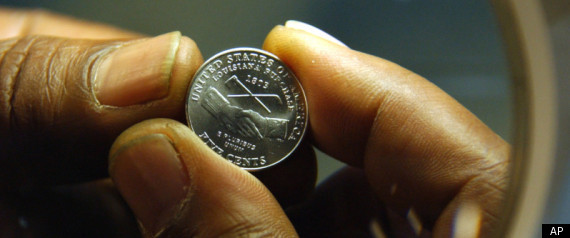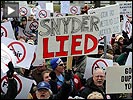 The Scene.
The Scene. John Baird seemed to stumble before catching himself.
“Mr. Speaker, our government is, and has always been,” he said this afternoon in response to a question from the NDP side, “committed to handling Afghan… Taliban prisoners in accordance with our international obligations.”
Taliban prisoners is indeed the preferred honorific. And four years after the treatment of those transferred to Afghan authorities by the Canadian Forces became a matter of public concern—four years after
allegations that Canadian-transferred detainees had been punched, choked, whipped and electrocuted by Afghan officials—much of the government’s response to so many questions of human rights, war, torture and parliamentary privilege would seem to involve this two-word phrase.
Earlier this month at the Conservative party convention, Jason Kenney used the phrase to
explain how in touch his party is with the common man. Yesterday, moments before thousands of pages of government documents were tabled, Justice Minister Rob Nicholson
employed the phrase three times in the space of two answers. In a brief appearance before the cameras shortly thereafter, Mr. Baird and Defence Minister Peter MacKay combined to use it 11 times in English and another four
en français. For good measure, Mr. Baird made one reference to “Taliban detainees.”
For the record, in the memorandum of understanding that set out the terms of the parliamentary review that was declared halted yesterday, the individuals in question are referred to as “Afghan detainees.” But so far as the government is apparently willing to recognize them, they are not so much citizens of the Islamic Republic of Afghanistan as they are members of the murderous enemy who gave shelter to Osama bin Laden and now threatens the lives of good Canadian men and women on a daily basis.
Perhaps it’s an unconscious verbal tic or the result of a linguistic fad—like chilaxin’ or whatever the teenagers are saying these days—that has organically spread around the cabinet table.
If, instead, it is the product of “communications” strategy—which is to say, a consciously scripted attempt to convey a specific message to the audience—we can only speculate at the intended insinuation.
Does it suggest, for instance, that the individuals in question are less worthy of concern? Does it imply, say, that anyone who expresses concern for the welfare of these individuals is somehow in league with the enemy? Could it leave the impression that such sympathizers might not possess within their souls a sufficient level of support for the troops?
Most concerning may actually be the possibility that the individuals transferred by the Canadian Forces to Afghan authorities are, in fact, members of the Taliban, evildoers intent on doing our men and women harm. Read through a few of the follow-up reports included in yesterday’s release and you will note references to transferred detainees who were subsequently released by Afghan officials. Were our allies in this war letting members of our common enemy go free?
Conversely there is what Richard Colvin wrote in a memo dated April 25, 2007.
“We would recommend that Canada, for reasons of our national interest, establish—and publicly announce that we are establishing—a Canadian capacity to monitor, in both Kandahar and Kabul, the treatment of Afghan detainees following their transfer to Government of Afghanistan (GoA) control,” he reported. “In our view, this would be most effective if accompanied by an attempt to reduce the numbers of Afghans detained by Cdn regular forces and handed to GoA. In our view, detainee methodologies in the field are too expansive, resulting in the detention of a significant number of Afghans who are not/ not insurgents or combatants. This view is shared [by a senior Afghan intelligence official].”
Is it possible then that not all of the individuals transferred to Afghan authorities were evildoers? If so, would those otherwise innocent individuals be more worthy of protection from torture?
Alas, that tidy two-word catchphrase does not quite explicitly answer such questions. But in the interests of expanding the discussion, Mr. Baird rose later in the hour to read from one of the documents tabled yesterday.
“Let us look at what certain detainees had to say,” he said. “One detainee, whom I will call Bob, indicated that the food and water he was provided and the things he was given to eat included meat, rice, fruits, bread and beans. He indicated that he was treated well. That is what some of the documents released yesterday said.”
And with that said Mr. Baird returned to his seat and shared a laugh with Tony Clement and Jim Flaherty.
Of course, there was as well the detainee who reported being “beaten with electrical cables while blindfolded.” And the detainee who reported being hit with cables and wires and shocked with electricity. And the detainee who reported being punched in the mouth. And the detainee who said he’d been slapped. And the detainee who reported being knocked unconscious and then beaten with a rubber hose. And the detainee who said he’d been beaten with a power cable. And the detainee who said he’d been beaten with a cable and threatened with death and sexual assault. And the detainee who said three others had “their fingers cut and burned with a lighter.”
Mr. Baird did not bother to give any of these detainees cute pet names. They will have to make due with being known collectively as “Taliban prisoners,” however much or little that is supposed to mean.
The Stats. Asbestos, seven questions. Canada Post and the G8 summit, five questions each. Immigration and Afghanistan, four questions each. Senate, employment, poverty and flooding, two questions each. The disabled, terrorism, bilingualism, railways, fisheries and infrastructure, one question each.
John Baird, 11 answers. Christian Paradis, eight answers. Stephen Harper, six answers. Diane Finley and Jason Kenney, three answers each. Jim Flaherty and Peter Van Loan, two answers each. Steven Fletcher, Keith Ashfield, Lisa Raitt and Denis Lebel, one answer each.
Origin
Source: Macleans 

















